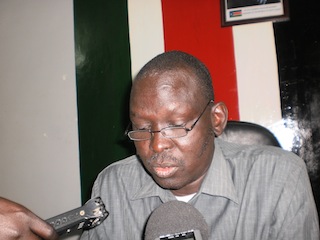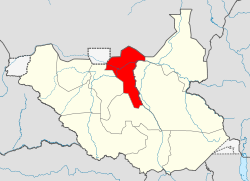Oil shutdown is correcting tax revenue shortfall in Unity State – official
By Bonifacio Taban Kuich
January 20, 2013 (BENTIU) – The financial crisis caused by the year-long oil shutdown in South Sudan is forcing Unity state to address the government’s relaxed attitude to tax collection, the state’s minister of agriculture and forestry told Sudan Tribune.

Following the oil shutdown a year ago South Sudan’s government has begun to look into diversifying its economy and how to increase revenues from other avenues.
In January last year South Sudan accused Sudan of confiscating oil entitlements worth about US$815 million. This was denied by Khartoum, which said it had only taken some oil as payment in kind for alleged unpaid transit fees.
When South Sudan seceded, it took with it 75% of Sudan’s oil production, but the necessary infrastructure needed to export oil to international markets remained in the north.
Before the shutdown South Sudan exported 350,000 barrels per day accounting for 98% of government income. The two sides have came to agreement in September last year on how much the South should pay for exporting its crude through the North but production has not resumed as Khartoum insists that security issues be resolved first.
A border conflict over the disputed region of Heglig in April last year led to a drop in imports and therefore customs revenue. Sudan had attempted to close the border for trade since 2011 but some Sudanese traders still manage to get goods into South Sudan.
Following the oil closure, South Sudan announced that no civil servant salaries would be reduced. However, some states have resorted to cutting pay, including Unity state, where government employees had their pay slashed by 25% in July last year. But this was reversed earlier this month when lawmakers voted to downsize the state government.
Five state ministries were scrapped in the move, with their responsibilities merged into the remaining 10 ministries.

The minister admitted they had become “used to getting oil money” and this had caused them to “relax” and not look at the bigger picture. However, the oil dispute has made them look to collect even the smallest taxes owed to the government, which had previously been overlooked.
Geng, who is also the chairman of the Unity state branch of the country’s ruling party, said the financial crisis has forced the young nation to address the rampant corruption that has blighted South Sudan since the Sudan People’s Liberation Movement (SPLM) gained control of the region under a 2005 peace deal.
For the last six years of the Comprehensive Peace Agreement (CPA), the former rebels governed the South as an autonomous region before a referendum in 2011 secured independence.
Last year president Salva Kiir wrote to 75 government officials asking them to account for $4 billion, which has gone missing since the SPLM took power.
Geng says financial reforms at a state level are essential to prevent individuals stealing money during the tax collection process. The system in Unity state was “weak” and “young” the minister said, adding that the government needs to adopt proper accounting and administrative processes.
South Sudan is still recovering from two decades of civil war, the minister said, and therefore “revenue collection is not perfect yet”. The Unity state cabinet is working on a bill that would standardise the amount collected for charcoal, grass and many other items, he said.
Some members of the state parliament accuse the finance ministry of failing to implement proper procedures in regard to collecting local revenues across the nine counties of Unity state.
The Unity state finance minister, Thomas Jal Kume, was called by local lawmakers to present how his ministry collects taxes on Friday, but MPs told Sudan Tribune they were not convinced by his explanation.
(ST)
